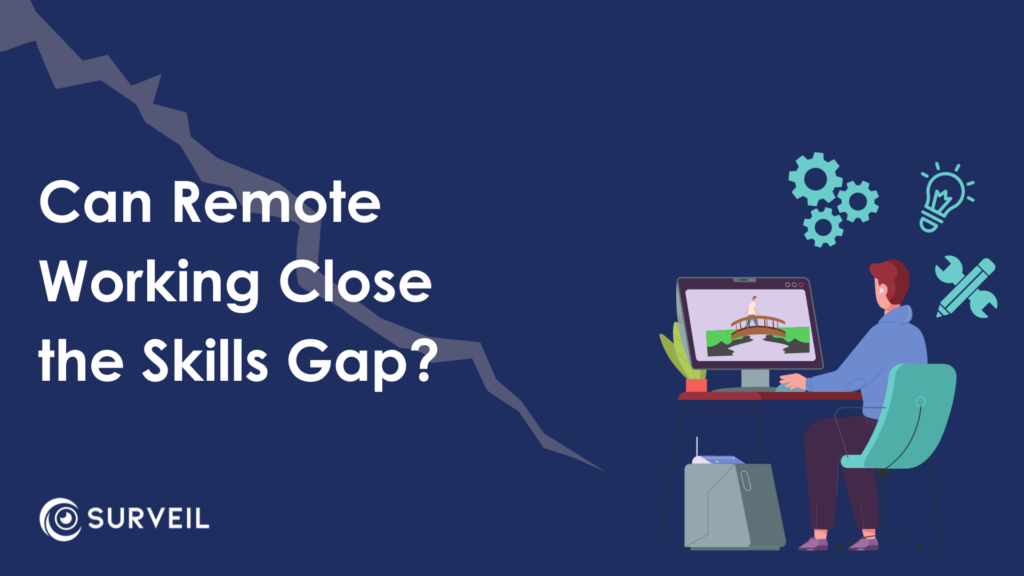Remote working’s meteoric rise these last few years has seen organisations benefit from lower costs, higher productivity, and a greater sense of employee wellbeing. But there’s an even greater prize to be won from this new way of working: it might just help to close the skills gap.
Today’s world is seeing an unprecedented surge in technological developments, with new and evolving advances impacting not only the professional sphere, but our everyday routines too. This rush of transformation has led to the emergence of a multitude of new job opportunities, all demanding proficiency in digital skills.
A recent report from World Economic Forum found that 50% of all employees will need to reskill by 2025 in order to keep up with this wave of change. On top of the need for reskill needs, the digital divide is already leading to higher employee turnover, causing further challenges for businesses. The cause of said turnover can be linked to the difference in expectations between employees wanting to up-skill and their employers’ ability to provide digital training. In particular, key concerns from employers include the cost of training, its efficacy, and the idea that training eats into time better spent on other priorities. But as we know, training is an attractive perk for many millennial workers.
How Can Remote Working Save the Day?
We all know that remote work – working from or another location rather than the office – has been consistently growing in popularity for years now. Here are a few ways that the flexible remote setup could help close the skills gap:
Tailored to Digital Natives
Remote work requires digital fluency and adaptability, making this way of working a natural way to close the existing skill gap. As employees navigate virtual workspaces and grapple with different communication tools, they need their everyday technical skills to keep pace. This promotes a culture of ongoing learning, as employees strive to stay competitive in a rapidly changing market. This pursuit of continuous improvement not only elevates individual careers, but also serves to narrow the skills gap in whole organisations.
Any Talent, Anywhere
By allowing employees to work from any location, remote work enables companies to tap into a global pool of skilled professionals, regardless of their physical proximity to the organisation’s main office. This access to a diverse talent pool not only promotes inclusivity but also provides companies with a broader range of expertise to draw from.
Skill Symphony
As remote work becomes more prevalent, it encourages a shift towards skills-based hiring and performance evaluation, focusing on actual capabilities rather than solely relying on academic qualifications or local availability. This evolution has the potential to bridge the skills gap by fostering a culture of lifelong learning, as well as enabling employees from all backgrounds to contribute meaningfully to the modern workplace.
Bridging the Digital Divide with Training
In order for remote and hybrid working to be successful in closing the skills gap, rethinking traditional training and embracing a culture of flexible learning is crucial. To retain talent and keep the company up to date with new technology, businesses must establish modern training schemes tailored to each learner’s unique requirements, that fits in flexible working set ups.
By meeting employees at their current skill level and offering a streamlined learning experience that optimises the advantages of training – all while minimising time commitments – will see your company closing the skills gap and gaining more efficiency.
This strategic approach not only helps businesses in tackling staff retention concerns in the modern world, but also serves to fulfil the growing demand of technology skills. As the market’s needs shift, the ability to adapt flexibly becomes an indispensable component of achieving business success.
Navigating Beyond the Horizon
The combination of remote work and updated training methods is a real game-changer for tackling the skills gap. When we seamlessly weave targeted training into remote work setups, employees can learn crucial skills while they do their regular day-to-day tasks. This not only boosts their skills, but also gives businesses a better chance to stay competitive. With industries changing fast, this dynamic duo of remote work and personalised training isn’t just closing the skills gap – it’s steering companies toward a future of innovation and staying ahead.
Despite remote work and specialised training being great steps towards closing the skills gap, it’s important to recognise that they are only a small part of a larger movement. Addressing the changing landscape needs more than one solution, involving not only a remote approach but striving to integrate digital skills into schools and dynamic apprenticeship programs. By embracing a multi-faceted perspective and maintaining great collaboration, everyone can evolve the professional world and secure a sustainable future together.
Surveil’s Microsoft adoption statistics help users to identify where training can help remediate licence wastage, while insights into devices, networks, and collaboration support the hybrid working capabilities helping your business to cross the skills gap. Want to know more? Contact your Microsoft partner and ask about Surveil.






